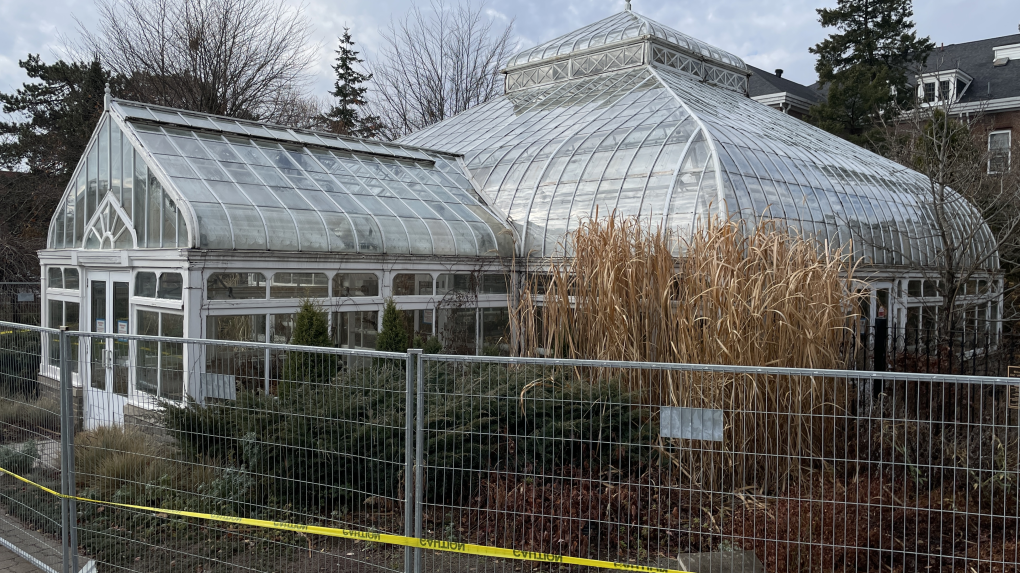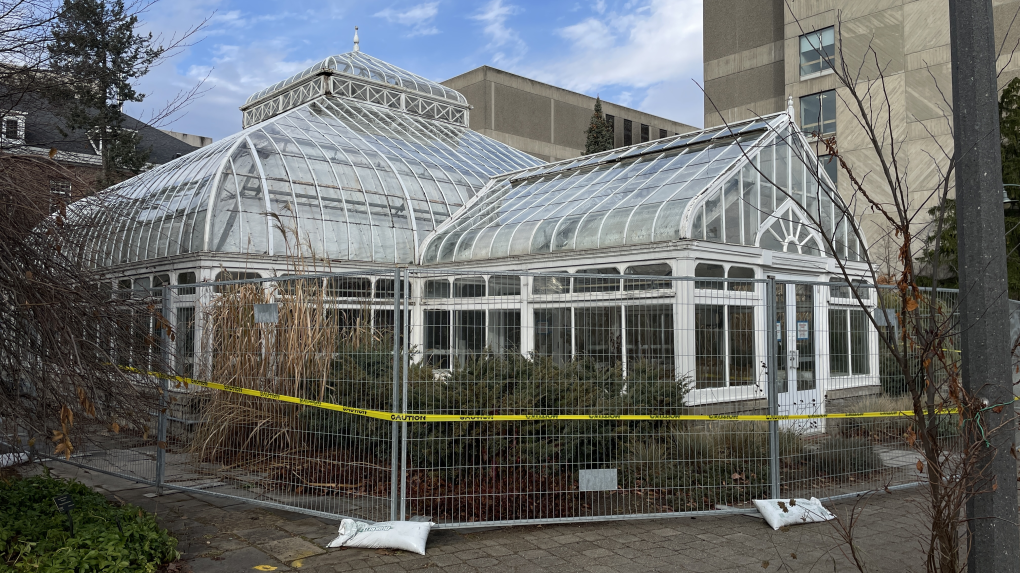Council approves University of Guelph's plan to demolish greenhouse
Guelph city council has given the University of Guelph the go-ahead to demolish a historic greenhouse on campus.
The vote on Tuesday came as several community members stepped forward to voice their opposition to the destruction of the Rutherford Conservatory building.
In an email to CTV News Krista Walkey, City of Guelph's general manager of planning and building services, said city staff considered the university’s plan to demolish the building aligned with a council decision from Nov. 13 stating that only ‘salvageable steel elements’ from the structure should be listed as heritage attributes.
Council approved the plan to demolish the structure, but added the school needs to try to preserve as much of the salvaged material as possible.
 The DM Rutherford Family Conservatory at the University of Guelph on Dec. 10, 2024. (Dave Pettitt/CTV News)
The DM Rutherford Family Conservatory at the University of Guelph on Dec. 10, 2024. (Dave Pettitt/CTV News)
According to the university’s website, they are planning to redevelop the land at 37 Christine Lane into a commemorative garden to preserve “the spirit of the Conservatory by maintaining a public space that both highlights the university’s rich contribution to horticulture and remains accessible to the community.”
The motion brought forward to council Tuesday night includes a stipulation that the university should incorporate the limestone and glass of the greenhouse into the garden.
The pagoda-style glass structure was originally built in 1930 for the Ontario Agricultural College. According to U of G’s website, the “header house served as the entrance into a complex of working greenhouses that supported teaching and learning in the study of floriculture.” When the other greenhouses were torn down in the late 1980s they left the conservatory as an “ornamental structure for public enjoyment.”
Repairs were made to the building over the years, but that came to an end in Nov. 2023.
The conservatory closed permanently as the “wood rot has considerably weakened the structure.”
The university said they commissioned independent structural engineering reports which determined the structure was unsafe. Restoration was pegged at $5 million, with another $200,000 to $250,000 required each year for maintenance.
Community petition
City staff recommended the conservatory be torn down, on the condition that the steel is saved for “future use in a commemorative structure.”
Guelph Councillor and University of Guelph alumnus Ken Yee Chew was at the meeting and said the preservation of materials and the creation of a garden could offer learning opportunities for incoming students.
"There is a cohort coming out of [COVID-19] right now. This would be a really big generational project for the (Ontario Agricultural College) community and for the design school as well. This is first-hand learning experience that students would be able to participate in," said Chew. "Heritage shouldn't just be preserved for the sake of aesthetics."
Some residents, however, hoped the councillors had a change of heart.
More than 1,400 people signed a petition to save the Rutherford Conservatory.
“It speaks to our heritage as the Ontario Agricultural College,” petition organizer Aimée Puthon explained. “I think it’s emblematic of our roots as a university, as a college, which is now a university [that] is globally recognized. This is really important, it’s irreplaceable and it’s a historic asset.”
 The DM Rutherford Family Conservatory at the University of Guelph on Dec. 10, 2024. (Dave Pettitt/CTV News)
The DM Rutherford Family Conservatory at the University of Guelph on Dec. 10, 2024. (Dave Pettitt/CTV News)
She said the community wanted to weigh in on the original plan.
“I urge the university to do all that they can to preserve this unique piece of architecture,” Puthon added. “It’s really and truly the crown jewel.”
Heritage Guelph, an appointed committee that advises city council, is among those who did not support demolition of the conservatory.
Alexandre Krucker, a member of the committee, spoke to the council on Tuesday.
"Fundamentally, we do not support demolition or deconstruction," said Krucker. "We urge council to consider providing more time for public input for the potential alternative solutions that might arise from the public."
After a meeting on Dec. 2, Heritage Guelph said more items saved like the glass from the structure and a demolition application should not be granted until a design for the commemorative structure is completed.
Advocates like Puthon agreed.
“The proposal by the university to salvage parts of the skeleton, such as metal, does nothing to preserve the living history,” she said. “Restore it. It has seen better days. It didn't get like this overnight. We really need some stewardship and some leadership for such an architectural piece like this.”
CTVNews.ca Top Stories

BREAKING Ontario Premier Doug Ford threatens to cut off energy to U.S. in response to Trump's tariffs
Ontario Premier Doug Ford threatened to cut off energy supply to the U.S. in response to the tariffs President-elect Donald Trump plans to impose on all Canadian imports.
Elon Musk calls Justin Trudeau 'insufferable tool' in new social media post
Billionaire Elon Musk is calling Prime Minister Justin Trudeau 'an insufferable tool' in a new social media post on Wednesday. 'Won't be in power for much longer,' Musk also wrote about the prime minister on 'X.'
Trudeau will have to 'kiss the ring' to achieve smoother bilateral relations with Trump: John Bolton
If Prime Minister Justin Trudeau wants to get on U.S. president-elect Donald Trump's good side for the sake of a smooth bilateral relationship, he'll likely have to be openly deferential, says former U.S. National Security Advisor, John Bolton.
Banks lower prime rates following Bank of Canada move
Canadian financial institutions are lowering their prime lending rates to match the decrease announced by the Bank of Canada.
Police locate labyrinth of tunnels connecting tents to generator in Hamilton encampment
Hamilton police say that they discovered a series of 'man-made holes and tunnels' during a patrol of a downtown encampment earlier this week.
Luxury real estate brokers charged in federal indictment with sex trafficking in NYC
Two luxury real estate brokers and their brother have been charged with luring, drugging and violently raping dozens of women over more than a decade.
Certain foods may disrupt your body's fight against cancer cells, study says
The food you eat may be affecting your body’s ability to fight cancer cells in the colon, according to a new study.
What happens next with Alex Jones' Infowars? No certainty yet after sale to The Onion is rejected
The Onion's rejected purchase of Infowars in an auction bid supported by families of the Sandy Hook Elementary shooting dealt them a new setback Wednesday and clouded the future of Alex Jones' conspiracy theory platform, which is now poised to remain in his control for at least the near future.
Canada Post strike: Talks deadlocked as sides clash on wages
Negotiations between Canada Post and the union representing its workers appear to be in a deadlock as the two sides remain far apart on wages and other issues.
































